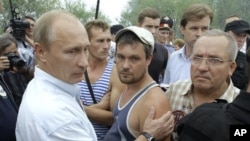Russia, the world's largest producer of oil and gas, has always taken a skeptical view of climate change. In the wake of last summer's fires, public opinion is shifting.
In the past, Prime Minister Vladimir Putin has joked that global warming would mean that Russians would buy fewer fur coats and enjoy longer growing seasons. But after the fires, he and many Russians are taking a more open-minded view of the impact of humans on their climate.
At a recent conference here on the Arctic, he surprised visiting scientists by supporting research into theories that burning hydrocarbons is causing a dangerous build up of greenhouse gases in the atmosphere.
Referring to global warming, he asked: "How are we influencing the speed of this process?"
Last summer's record high temperatures did not just bring Miami heat to Moscow. Droughts destroyed one third of the nation's grain crops, causing $1.3 billion in losses to farmers.
Around Moscow, fires smoldered unchecked in dried out peat bogs, filling the capital with woodsmoke. According to new figures, Moscow alone saw 9,000 extra deaths in August - almost a 70 percent jump in the mortality rate. Across Russia, the mortality rate jumped by more than one quarter.
According to a new survey, one third of Russians polled attributed the fires to global warming. An overwhelming majority expected a repeat of the fires next summer.
Igor Chestin, executive director of WWF Russia, has watched the change in public attitudes in a nation that relies heavily on its oil and gas exports:
"The public does not think they can do anything about it," said Chestin. "It is just something that happens, but it is not in their hands."
At the Arctic conference, Alexander Bedritsky, the Kremlin's advisor on climate change, said that temperatures in the Russian arctic had increased twice as fast as in the rest of the world.
Last week, a Norwegian trimaran, the Northern Passage, completed circling the North Pole in a single summer season. With much of the route going through Russian waters, the crew said in a statement: "Less than 10 years ago, the first steel-hulled sailboat managed to get through just one of the passages, and 100 years ago, a circumnavigation would have taken six years."
At the Moscow conference, Anatoli Brouchkov, a permafrost expert at Moscow State University' said that climate change is eroding the permafrost, the frozen soil layer essential for construction in the Russian Arctic
"About 50 percent of the buildings in the Russian Far North are damaged," said Brouchkov.
With Russian public opinion shifting, Russian leaders increasingly call for energy efficiency in a gas guzzling economy.
As a sign of the times, Moscow's new mayor, Sergei Sobyanin, vowed Thursday to impose construction standards that could raise the energy efficiency in new homes and offices by 30 percent.
Russians Take Another Look at Global Warming
- By James Brooke




